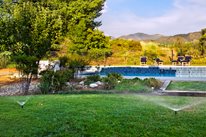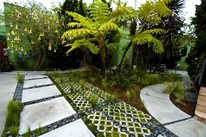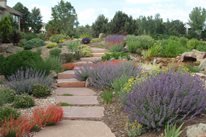Keys to a High-Efficiency Irrigation System
Discover five principles for designing a low-water irrigation system
"The wars of the next century will be about water."
Ismail Serageldin, former vice president of the World Bank, said the above in 1999. Whether that proves true or not, the battle to lower water use is in full swing. Homeowners and landscape contractors are working together to design landscapes that require less water. When an irrigation system is needed, it is expected to be efficient.
Unfortunately many sprinkler systems are poorly designed. A poorly designed system can be reliable and keep your garden green, but it will not be water wise. Some systems are so fundamentally flawed that they cannot even take advantage of “smart” timers and other advances that lower water use.
To install or purchase sprinklers that will sip instead of gulp water you need to understand the basic principles of a quality system. Here are 5 fundamental keys to a low water use sprinkler system:
- Water Pressure.
Spray irrigation works best between 30 and 50 psi. Drip irrigation works well at lower pressure. For an efficient system you want water pressure that is not too high and is consistent. High water pressure causes misting or fogging allowing a good portion of the water to blow away or evaporate. Having consistent pressure ensures that all the heads that make up a zone perform uniformly. Installing pressure regulating sprinkler heads eliminates any worry about misting or inconsistent watering. - Separate Lawn and Beds.
Plant material with similar water needs should be irrigated together. If a zone waters both lawn and shrubs, for example, the shrub area will have to be over watered to keep the lawn happy. This is a common design flaw; don't let it happen to you! - Match Precipitation Rates.
“Precipitation rate” is the amount of water a head puts out per square foot of ground it covers. Typical spray nozzles are automatically matched. Rotor heads, however, require the installer to ensure the rates are uniform. Why is this important? Rotors can be set to water a large area, or a small one. Imagine two rotors, one covering 300 square feet and the other 150 square feet. What will happen if they both receive the same nozzle? The 150 square feet will receive twice as much water per square foot! That head should have a nozzle that puts out half the water- thus matching the precipitation rates. This is another common design flaw that results in wasted water. You end up drowning one area just to keep another area happy. - Low Precipitation Rate Nozzles.
In the last few years a new and improved breed of spray nozzles has emerged- low precipitation rate nozzles. The most efficient of these are “rotary” style nozzles that can be added to any typical spray head body. These nozzles put out less water, reducing run off, puddling, and misting. If traditional nozzles are like a summer monsoon, rotary nozzles are a gentle drizzle - and that's a good thing. - Automatic Timers.
No system is complete without an automatic timer. You should be thoroughly trained in the use of your timer and understand when and how to water. Not interested in closely monitoring your system? Then a “smart” timer might be for you. Smart timers use weather data, either from an internet connection or small weather sensor, to determine when your system should water and for how long. Most people will use at least 40% less water with a smart timer. The larger your property the more it makes sense to upgrade to one.
No one doubts that water will continue to be increasingly precious and expensive. As a homeowner you need to know that your irrigation system is not part of the problem. Having a grasp of the basic principles that underpin a quality system allows you to choose a contractor wisely. A high quality, water wise, irrigation system will usually cost more. However, they pay for themselves many times over. Make your next irrigation system a truly efficient one!
Ross NW Watergardens
Portland, OR
|
Contributing Author: Ben Bowen, guest writer for Landscaping Network and landscape manager for Ross NW Watergardens |



 Sprinkler Systems
Sprinkler Systems Sustainable Landscaping
Sustainable Landscaping Xeriscaping
Xeriscaping

